

Swashbuckler
A dashing fencer in a neat leather jerkin stands across the square, rapier held en garde. His neat moustache, waxed to points, is more gray than black; his fearsome reputation has been earned over a lifetime of challenges. As his opponent warily draws a blade, he twirls the blade in his hand, strafing a flash of sunlight across the anxious crowd.
A pistol-wielding pirate swings over the railing, a curved knife clutched in her teeth. The rope swings back behind her as she lands on the deck, guns booming, and ducks underneath a savage cutlass swing. Her first shot downs one foe; her second catches the enemy captain in the shoulder, though he stays standing and levels his own hand cannon. But her shot is faster - tossing her pistol the deck, she whips a spare from her brace and drills a lead ball straight through the man's heart.
An elegant woman in practical but stylish garb glances around the corner, waiting for the sound of her teammate's distraction. It never comes. Scowling, she snaps her fingers, then her eyes glow as she intones some magic words and conjures an illusory dragon, soaring over the city. Amid the surprise, she slips past and to the vault entrance, dispatching the guard in a single stab thanks to a hallucinatory spider dropping on him from above.
A masked warrior leaps off the edge of a guard post, steel flashing under a dusty desert sun. Throwing knives explode from their fingertips, catching two guards in the neck, before the black-clad figure draws a rapier and does battle with the lieutenant. The vigilante slices their sigil into the officer's shirt, before jumping atop a horse and riding off into the distance.
Fighting with Flair
Swashbucklers are daring duelists, lightly-armored combatants who dance around the battlefield and frustrate their foes. Uninterested in the brute strength of a fighter or the skulking sneak attacks of a rogue, the swashbuckler is more interested in flashy maneuvers and dashing deeds. A swashbuckler is more likely to explain to an enemy, in detail, exactly how they will win the fight, before winning the fight precisely as foretold.
Swashbucklers build up to devastating strikes, peppering their combats with tricks, taunts, and acrobatic leaps. They build up panache in combat, awing their opponents to set the stage for elaborate maneuvers. They are notable for their ability to strike devastating blows - not surprise attacks like a rogue would, but simply an uncanny skill at observing their foes' movements and finding precisely when and where to attack.
Swashbuckler
| Level | Proficiency Bonus | Features | Maximum Panache | Tricks of the Trade Known |
|---|---|---|---|---|
| 1st | +2 | Rakish Expertise, Panache, Debonair Deeds | 2 | — |
| 2nd | +2 | Deft Strike (19-20), Tricks of the Trade, Fighting Style | 2 | 1 |
| 3rd | +2 | Swashbuckler Code | 3 | 1 |
| 4th | +2 | Ability Score Improvement | 3 | 1 |
| 5th | +3 | Extra Attack | 3 | 2 |
| 6th | +3 | Instant Action, Deft Strike (18-20) | 4 | 2 |
| 7th | +3 | Code Feature | 4 | 2 |
| 8th | +3 | Ability Score Improvement | 4 | 3 |
| 9th | +4 | Suave Evasion | 4 | 3 |
| 10th | +4 | Deft Strike (17-20) | 5 | 3 |
| 11th | +4 | Code Feature | 5 | 3 |
| 12th | +4 | Ability Score Improvement | 5 | 4 |
| 13th | +5 | Surprising Strike | 5 | 4 |
| 14th | +5 | Deft Strike (16-20) | 5 | 4 |
| 15th | +5 | Code Feature | 6 | 4 |
| 16th | +5 | Ability Score Improvement | 6 | 4 |
| 17th | +6 | Last Stand | 6 | 4 |
| 18th | +6 | Lightning Reflexes | 6 | 4 |
| 19th | +6 | Ability Score Improvement | 6 | 4 |
| 20th | +6 | Code Feature | 6 | 4 |


Creating a Swashbuckler
Making a swashbuckler requires knowing what drew your character to the swashbuckling lifestyle. Have they always been theatrical and charming? Did they discover their calling later in life? Did they set out to seek adventure, or did rakish behavior force you onto its path?
Swashbucklers tend towards chaotic alignments, with their heavy emphasis on improvisation and quick thinking. But nothing precludes a lawful swashbuckler - one who is driven to uphold order, or who prefers to prepare their displays of showmanship with well-laid plans.
Quick Build
You can make a swashbuckler quickly by Selecting Dexterity as your highest attribute, followed by Charisma or Constitution. Second, choose a background that reflects a noble upbringing or nautical profession.
Class Features
As a swashbuckler, you gain the following class features.
Hit Points
- Hit Dice: 1d8 per swashbuckler level
- Hit Points at 1st Level: 8 + your Constitution modifier
- Hit Points at Higher Levels: 1d8 (or 5) + your Constitution modifier per swashbuckler level after 1st
Proficiencies
- Armor: Light armor and bucklers
- Weapons: Simple weapons, martial weapons, firearms
- Tools: One musical instrument of your choice, water vehicles
- Saving Throws: Dexterity, Charisma
- Skills: Choose four from Acrobatics, Athletics, Deception, History, Insight, Intimidation, Investigation, Performance, Persuasion, Sleight of Hand, and Stealth.
Equipment
You start with the following equipment, in addition to the equipment granted by your background:
- (a) a martial weapon and buckler, or (b) two martial weapons
- (a) a light pistol and 20 bullets, or (b) a simple weapon.
- (a) leather armor, or (b) a buckler
- (a) a diplomat's pack, (b) an entertainer's pack, (c) an explorer's pack
Alternatively, you may start with 5d4 × 10 gp to buy your own equipment.
Appendix 1 contains new equipment, including bucklers and a number of new firearms.
Rakish Expertise
At 1st level, you are expert in witty repartee and thinking on your feet. Select one skill out of Acrobatics, Deception, Intimidation, Persuasion, and Sleight of Hand. If you are proficient with that skill, your proficiency bonus is doubled for any ability check you make that uses that proficiency. If you are not proficient, you gain proficiency with it.
Panache
Also at 1st level, you fight with such flair that even your enemies must admire you, a little bit. When you perform daring deeds in combat, you gain a point of Panache. You can have Panache up to your Maximum Panache, as listed in the Swashbuckler table, and all your Panache disappears once you have neither earned nor spent any Panache for 1 minute. You can earn Panache by:
- Rolling Initiative: Gain Panache equal to half your proficiency bonus when you roll initiative.
- Critical Hit: Gain 1 Panache when you roll a critical hit in combat.
- Flashy Fighting: Gain 1 Panache at the end of your turn if you did damage to an enemy of CR 1/4 or higher.
- Gratuitous Flourish: As an action, perform a stylish gesture to impress onlookers and gain 1 Panache.
Your Swashbuckler Code may give you alternate ways to earn Panache.
You may spend your Panache to perform a variety of debonair deeds, as described below. If an ability calls for a saving throw, you calculate the DC as follows:
Panache save DC = 8 + your proficiency bonus + your Charisma modifier
Debonair Deeds
Also at 1st level, you may surprise your overawed foes with theatrical displays of skill. You may expend 1 Panache to perform any of the deeds described below.
- Swift Parry: As a reaction when you would be hit by an attack while wielding a melee weapon, you may add your Charisma modifier to your AC. If the attack still hits, you may roll your weapon's damage and subtract the result from the attack's damage.
- Distracting Taunt: As a bonus action, you call out to an enemy within 60 feet to break their focus. The target must make a Wisdom saving throw against your Panache DC. On a failure, they have disadvantage on the next attack roll they make.
- Nimble Step: As a bonus action, you may move up to half your movement speed without provoking attacks of opportunity.
You will gain additional uses for your Panache as you level, and through your swashbuckler code.
Deft Strike
Also at 2nd level, you become an expert in piercing your foes' defenses. Your attack rolls can now have a critical range - if the number on the d20 is any number in that range, you score a critical hit. This critical range starts as just a 20.
Whenever you end your turn in combat, your critical range increases by 1. Before you take the Attack action on your turn, you may spend any amount Panache to immediately increase your critical range that many times. When you score a critical hit, your critical range resets to 20.
At 2nd level, your maximum critical range is 19-20. Your maximum critical range increases with your level in this class: 18-20 at 6th, 17-20 at 10th, and 16-20 at 14th level.
Tricks of the Trade
At 2nd level, you learn a technique or adopt a mannerism to set you apart from your rivals. You start off knowing one Trick of the Trade, and learn more according to the Tricks of the Trade column on the Swashbuckler table. Available tricks are listed at the end of the class description.
Additionally, when you gain a level in this class, you can choose one of the tricks you know and replace it with another trick that you could learn at that level.
If a trick of the trade has prerequisites, you must meet them to select it. You may choose the trick at the same time that you meet its prerequisites. A level prerequisite refers to your level in this class. If a trick of the trade grants you a spell, Charisma is your spellcasting ability for it.
Fighting Style
Additionally at 2nd level, you adopt a particular style of fighting as your specialty. Choose one of the following options. You can't take a Fighting Style option more than once, even if you later get to choose again.
-
Crack Shot: When you attack an enemy behind cover with a ranged weapon, you may treat three-quarters cover as if it is half cover, and you may ignore half cover.
-
Dueling. When you are wielding a melee weapon in one hand and no other weapons, you gain a +2 bonus to damage rolls with that weapon.
-
Mixed Technique. When you attack with a light melee weapon and engage in two-weapon fighting, you can use a light one-handed ranged weapon in your other hand to make the additional attack. The bonus attack may ignore disadvantage caused by having an enemy within 5 feet.
-
Two-Weapon Fighting. When you engage in two-weapon fighting, you can add your ability modifier to the damage of the second attack.
Improved Two-Weapon Fighting
It is highly recommended, but optional, to allow these variant rules for two-weapon fighting.
Swashbuckler Code
At 3rd level, you master the specific techniques of a Swashbuckler Code. Your choice grants you features at 3rd level, and again at 7th, 11th, 15th, and 20th level.
Ability Score Improvement
When you reach 4th level, and again at 8th, 12th, 16th, and 19th level, you can increase one ability score of your choice by 2, or you can increase two ability scores of your choice by 1. As normal, you can't increase an ability score above 20 using this feature.
Extra Attack
Beginning at 5th level, you can attack twice, instead of once, whenever you take the Attack action on your turn.
Instant Action
Also at 6th level, you are able to display a truly impressive amount of Panache, in a crucial moment. As a bonus action, you can generate Panache equal to your Charisma modifier. Once you generate Panache in this way, you can't do so again until after a short rest.
Suave Evasion
Beginning at 9th level, you are light on your feet and difficult to pin down. When you have Panache, you can choose to use your Charisma modifier in place of your Strength or Dexterity modifier when rolling Strength or Dexterity saving throws.
Surprising Strike
At 13th level, you are able to take your foes by surprise with an unexpected blow. After you roll a critical hit with a weapon attack, or for the cost of 2 Panache after you hit an enemy with a melee weapon attack, you can immediately make another attack with a weapon.
Surprising Strike explicitly doesn't work with automatic critical hits, such as against a paralyzed target.
Last Stand
At 17th level, as a reaction when you would be reduced to 0 hit points but not killed outright, you can move up to half your movement speed and spend any amount of Panache. Make one weapon attack for each point of Panache spent. After you complete these attacks, you fall to 0 hit points.
You can use this ability once, regaining its use after completing a long rest.
Lightning Reflexes
At 18th level, your swiftness in combat is unparalleled, and your enemies stand in awe of your skill. You can take two reactions per round, though you cannot take a reaction twice to the same triggering event.
Multiclassing
Should you want to multiclass into swashbuckler, the prerequisites and proficiencies are listed below:
- Prerequisite: 13 in Dexterity and Charisma.
- Proficiencies gained: Light armor, firearms


Tricks of the Trade
These are the available options you can learn as part of your Tricks of the Trade feature. Each Trick can only be selected once.
Behind the Mask
You gain proficiency with disguise kits, and learn the disguise self spell. You can cast it once without expending a spell slot, regaining the ability to do so after completing a long rest.
Climb Like a Monkey
You gain a climbing speed equal to your walking speed.
Drink Like a Sailor
You gain proficiency with brewers' tools, and anytime you are poisoned, you have advantage on saving throws to avoid being frightened.
Eagle Eye
You gain proficiency in the Perception skill, and you are able to make out details at twice the distance as normal for your species.
Proper Scoundrel
You gain proficiency in thieves' tools, and can double your proficiency bonus for any abiility checks you make with them.
Shoulder Parrot
You learn the find familiar spell. You can cast it once without expending a spell slot, regaining the ability to do so after completing a long rest.
Silver Tongue
When you or an ally within 30 feet fails a Charisma skill check, you may interject and attempt to save face, adding a d4 to the result and potentially changing the outcome. If you have already used this ability to influence a creature, you cannot influence that creature again until after a long rest.
Eye for the Prize
You are expert at appraising the value of items, and at convincing others to believe you when you do so. You gain proficiency with Forgery Kits, instantly know the value of treasure and art objects, and gain advantage on Charisma (Persuasion) and Charisma (Deception) checks when haggling or negotiating financial transactions.
Swim Like a Fish
You gain a swimming speed equal to your walking speed.
Treasure Hunter
You learn the detect magic spell. You can cast it once without expending a spell slot, regaining the ability to do so after completing a long rest.
Tools of the Trade
You have a knack for improvising with tools you aren't familiar with. Anytime you roll an ability check to use tools with which you are not proficient, you may add half your proficiency bonus to the roll.
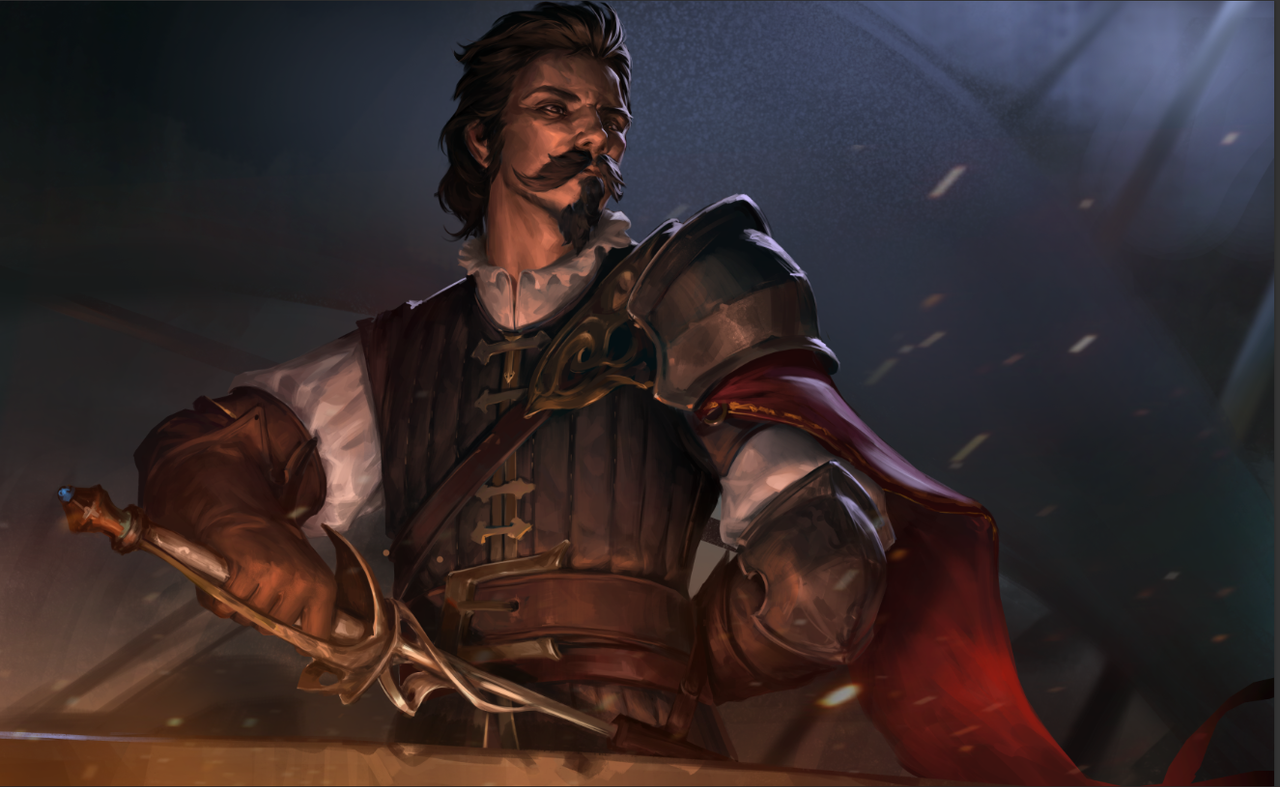

Swashbuckler Codes
Swashbucklers choose a focus and learn specific techniques as they weave around the battlefield. You may choose which code your swashbuckler follows from the options listed below.
Code of the Duelist
Duelists are honorable combatants with an emphasis on single combat. Their code puts a heavy emphasis on fair fights, on honing one's own skill, and on protecting the weak against the strong. There is no glory in a guaranteed victory, after all, nor one gained through underhanded means.
Duelists may come from any background, though they're likely to have at least brushed against wealth or formal training. And while the duelist's code is honorable, just because one fights with the style of a duelist doesn't mean one actually obeys the code's tenets. Evil duelists certainly exist, using their skill at single combat to seek power without regard for the consequences.
Duelist's Swagger
When you adopt this code at 3rd level, you begin to acquire a reputation as a fearsome combatant, and to carry yourself accordingly. You gain proficiency in the Persuasion or Intimidation skill, or another skill of your choice if you are already proficient in both.
Marked Foe
Also at 3rd level, you hone your skill for single combat, and more importantly, your single-minded focus can be turned to your enemies. When you roll initiative or as a bonus action at any time, you can taunt a specific creature you can see within 30 feet, marking them as your target. Your mark lasts for 1 hour, and you can only have one marked foe at a time.
You have advantage on your first attack roll each round against your Marked Foe, and you gain 1 point of Panache the first time on a turn that your Marked Foe misses an attack against you.
Infuriating Taunt
Also at 3rd level, you learn a new deed.
Infuriating Taunt: You call out a target within 30 feet who can hear you, enraging them into a sudden strike. As a bonus action, you can spend 1 Panache taunting an enemy. They must make a Wisdom saving throw. On a failure, they have disadvantage to attack any targets other than you until the end of their next round, and if possible, they must immediately use their reaction to make one attack at you with disadvantage.
Lightning Parry
At 7th level, your blade flashes faster than your opponents can follow. Once per round, you may use your Swift Parry without spending your reaction.
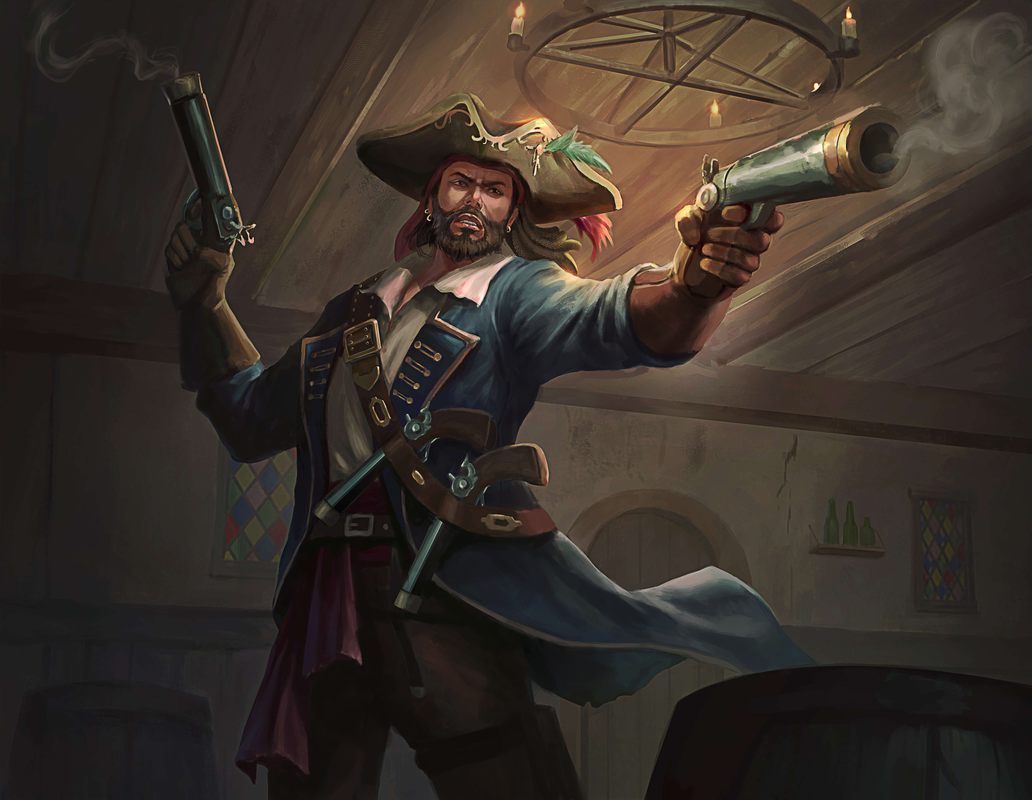

Duelist's Dance
At 11th level, enemies always have disadvantage on attacks of opportunity against you. As a reaction when your marked foe makes an attack of opportunity against you, you may force the attack to miss.
Additionally, you now gain 1 Panache when any enemy misses an attack against you for the first time on a turn, not just your Marked Foe.
Relentless Assault
At 15th level, your deadly aim and rapid blows spell doom for your chosen targets. Anytime you hit your marked foe with a weapon attack, you may spend any amount of Panache to deal an additional 1d8 damage of your weapon's type per Panache spent.
To the Death
At 20th level, your reputation and skill are such that any opponent would fear to face you. Any damage caused by your marked foe which would reduce you to 0 hit points but not kill you outright instead reduces you to 1 hit point. If and only if you are at 1 hit point and have no temporary hit points, your marked foe's damage can reduce you to 0 as normal.
Additionally, the first time on your turn you damage your marked foe with an attack, you gain temporary hit points equal to the damage dealt.
Code of the Pistolier
The pistolier is a swashbuckler who always brings a gun to a knife fight. Their code prioritizes winning - winning in style, to be sure, but a quick hand with a pistol is better than an honorable blade any day. They are more likely to be pirates, mercenaries, or at least a little rough around the edges.
Pistoliers come from any walk of life. Many come from wealth, the better to afford their cutting-edge armaments, but some may get their guns second-hand (or under the table). Good-aligned pistoliers might be gritty idealists or criminals with a heart of gold, while evil pistoliers make picture-perfect pirates.
Black Powder Expert
When you adopt this code at 3rd level, you develop an expertise with firearms that is nearly unrivaled. You gain proficiency in smith's tools, and you can double your proficiency bonus when making ability checks to craft or repair firearms.
Pistol Specialist
Also at 3rd level, you have honed your focus on deadly pistols, on their own or alongside blades. You gain the following benefits:
- When making a ranged attack with a one-handed firearm, you do not have disadvantage if an enemy is within 5 feet of you.
- You can draw and stow a light pistol anytime you fire one without using an object interaction.
- The first time you hit an enemy with a ranged attack on your turn, you gain 1 Panache.
Packed Powder
Also at 3rd level, you learn a new deed.
Packed Powder: As a bonus action, you may spend 1 Panache to prepare an especially powerful shot for one of your firearms. The next attack you make with that gun, if it hits, deafens the target and staggers them, reducing their movement speed by 10 feet. If this attack is a critical hit, it triples the damage dice rather than doubling them.
Scoot and Shoot
At 7th level, you become adept at dodging out of your opponents' reach. Once per round after an enemy hits you with a melee attack, you can move 10 feet without provoking attacks of opportunity.
Short Barrels
At 11th level, your Pistol Specialist ability improves. You now gain 2 Panache the first time you hit an enemy with a ranged attack on your turn.
Snap Shot
Also at 11th level, you learn a new deed.
Snap Shot: As a reaction when you see an enemy moving within 15 feet of you, you may spend 2 Panache to make an attack of opportunity with a pistol you are holding.
Disarming Shot
At 15th level, your accuracy is such that you are able to disrupt an enemy's attacks with your shots. When you use your Packed Powder or Snap Shot, you may spend 1 additional Panache to give the affected creature disadvantage on their next attack roll.
Hail of Lead
At 20th level, when you take the Attack action, you can spend any amount of Panache to make 1 additional attack per Panache spent. These attacks all have disadvantage, but deal increasing amounts of bonus damage if they hit. This bonus damage is 1d6 per additional attack, cumulatively (the first attack deals 1d6 bonus damage, the second deals 2d6, etc.). This bonus damage is of the same type as your weapon's damage.
Loading Schmoading?
Unlike many firearm-focused archetypes, the Pistolier does not inherently get to ignore the loading property of their weapons. Pistoliers typically carry many guns, drawing and stowing them as needed.
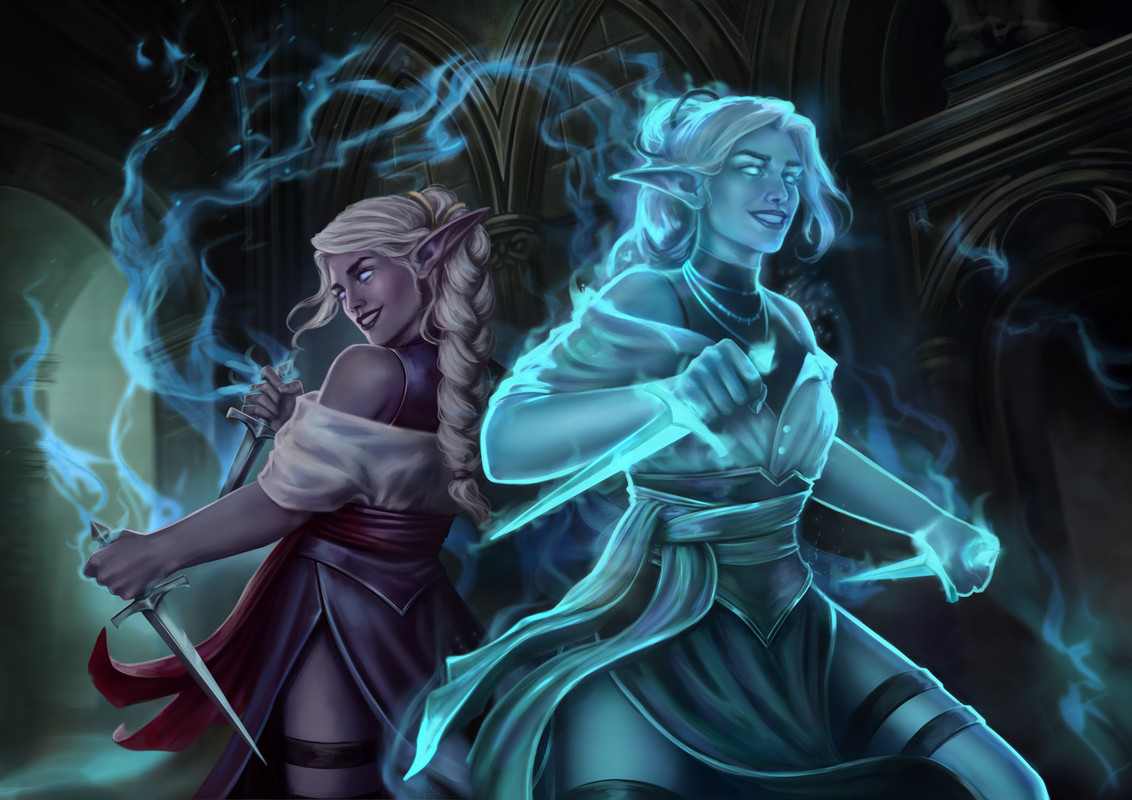

Code of the Trickster
The trickster is just as daring as other swashbucklers, but considerably more wide-ranging in the tools they master. The best way to ensure your rapier strikes true, after all, is for a big flashy distraction to occur at the last second. They add illusion magic to their toolkit, all the better to keep their foes off-balance. The trickster's code has few real tenets; while others might preserve their honor in defeat, a trickster's concern is only "there's no winning in it."
Tricksters are often born with a little innate magic ability, but rarely rely on intellectual study. Rather, they pursue an intuitive approach, akin to sorcerers, but only ever as a compliment to a swift sword-hand. Wealthy tricksters may have gotten their magical training thanks to family connections, while less-advantaged ones might have figured out their knack naturally, deploying it out of desperation.
Spellcasting
When you reach 3rd level, you augment your martial prowess with the ability to cast spells. See Spells Rules for the general rules of spellcasting and the Spells Listing for the sorcerer spell list.
Cantrips
You learn three cantrips: minor illusion and two other cantrips from the sorcerer spell list which belong to the illusion, transmutation, or enchantment schools. You learn an additional sorcerer cantrip that meets these requirements at 10th level.
Spell Slots
The Trickster Spellcasting table shows how many spell slots you have to cast your sorcerer spells of 1st level and higher. To cast one of these spells, you must expend a slot of the spell’s level or higher. You regain all expended spell slots when you finish a long rest.
Trickster Spellcasting
| Level | Cantrips Known | Spells Known | 1st | 2nd | 3rd | 4th |
|---|---|---|---|---|---|---|
| 3rd | 3 | 3 | 2 | — | — | — |
| 4th | 3 | 4 | 3 | — | — | — |
| 5th | 3 | 4 | 3 | — | — | — |
| 6th | 3 | 4 | 3 | — | — | — |
| 7th | 3 | 5 | 4 | 2 | — | — |
| 8th | 3 | 6 | 4 | 2 | — | — |
| 9th | 3 | 6 | 4 | 2 | — | — |
| 10th | 4 | 7 | 4 | 3 | — | — |
| 11th | 4 | 8 | 4 | 3 | — | — |
| 12th | 4 | 8 | 4 | 3 | — | — |
| 13th | 4 | 9 | 4 | 3 | 2 | — |
| 14th | 4 | 10 | 4 | 3 | 2 | — |
| 15th | 4 | 10 | 4 | 3 | 2 | — |
| 16th | 4 | 11 | 4 | 3 | 3 | — |
| 17th | 4 | 11 | 4 | 3 | 3 | — |
| 18th | 4 | 11 | 4 | 3 | 3 | — |
| 19th | 4 | 12 | 4 | 3 | 3 | 1 |
| 20th | 4 | 13 | 4 | 3 | 3 | 1 |
Spells Known of 1st-Level and Higher
You know three 1st-level spells of your choice from the sorcerer spell list, of the illusion or enchantment school.
The Spells Known column of the Trickster Spellcasting table shows when you learn more spells of 1st level or higher. Each of these spells must be an enchantment or illusion spell of your choice, and must be of a level for which you have spell slots. For instance, when you reach 7th level in this class, you can learn one new spell of 1st or 2nd level.
Whenever you gain a level in this class, you can replace one of the sorcerer spells you know with another spell of your choice from the sorcerer spell list. The new spell must be of a level for which you have spell slots, and it must be an enchantment or illusion spell.
Spellcasting Ability
Charisma is your spellcasting ability for your sorcerer spells, since you learn your spells through innate ability and practice. You use your Charisma whenever a spell refers to your spellcasting ability. In addition, you use your Charisma modifier when setting the saving throw DC for a sorcerer spell you cast and when making an attack roll with one.
Spell save DC = 8 + your proficiency bonus + your Charisma modifier
Spell attack modifier = your proficiency bonus + your Charisma modifier
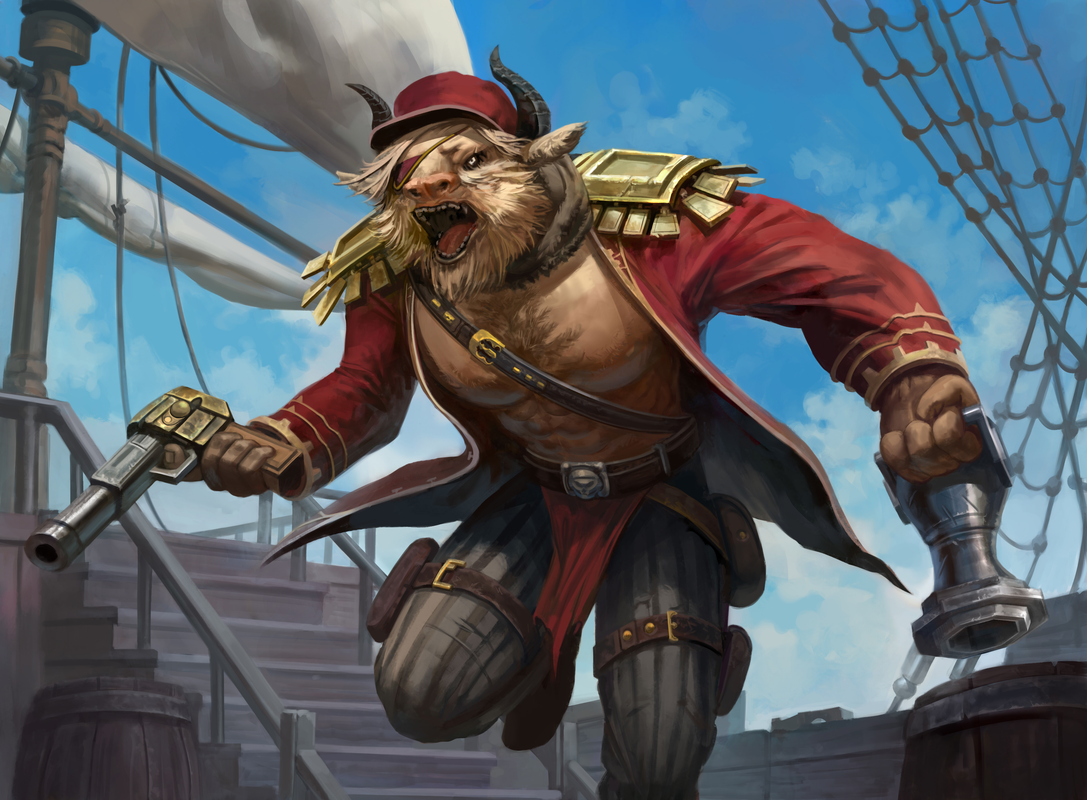

Distracting Glamour
Also at 3rd level, you learn a new deed.
Distracting Glamour: As a bonus action, you can spend 1 panache to cast minor illusion directly in front of a creature you can see within 30 feet. That creature must make an Intelligence saving throw. If they fail, you have advantage on your next attack against them before the end of your turn.
Stylish Spellcasting
Also at 3rd level, you learn to incorporate your magic into your combat rhythms. Anytime you cast a trickster spell of 1st level or higher, you gain Panache equal to its spell level (up to your maximum Panache).
Swiftspell
At 7th level, when you take the Attack action, you may cast any illusion spell you know with a casting time of 1 action in place of one of the attacks. After you do so, you may Disengage as a bonus action.
Mirrored Blows
At 11th level, you interleave your spells and attacks seamlessly. When you cast a leveled spell on your turn, you imbue your weapon with a jolt of arcane energy. The next time you deal damage with a weapon attack before the end of your next turn, you deal 1d6 additional psychic damage per level of the spell.
Fading Blow
At 15th level, either as a bonus action or when you Disengage as part of your Swiftspell ability, you may spend 2 Panache to turn invisible until the end of your next turn.
Lethal Trickery
At 20th level, you learn the phantasmal horror* spell, or another illusion spell of your choice if you already know it.
Anytime you score a critical hit with a weapon attack, or by spending 3 Panache after you hit normally, you may cast phantasmal horror without spending a spell slot against the enemy you hit as a bonus action. After an enemy has made a save against your phantasmal horror when cast in this way, they automatically succeed on saves against the spell for 24 hours.
*See the Spells Appendix.
Code of the Ruffian
The ruffian is a bruiser, a thug who takes the swashbuckler's dashing style and puts it towards more brutal ends. They showcase brute strength where other swashbucklers exhibit elegance; why bother with a graceful rapier feint when a mace to the head will get the job done, and faster? The bigger the weapon, and the louder the cannon, the better, as far as ruffians are concerned.
Ruffians are rough-and-tumble, often learning their trade in tavern brawls and dockside arenas. Still, some do come from noble backgrounds and simply prefer to defy expectations. They often follow their own sort of ethical code; an unfair fight doesn't do the spectators much good, after all.
Black Flag Bruiser
At 3rd level, you gain proficiency with medium armor and shields. You also gain proficiency in the Athletics or Intimidation skill, or another skill of your choice if you are already proficient in both.
In addition, you are proficient using pistols as melee weapons, dealing 1d4 bludgeoning damage on a hit, and using hand cannons as Two-handed Heavy melee weapons, dealing 1d10 bludgeoning damage on a hit.
Rough 'Em Up
Also at 3rd level, you begin to emphasize your brute strength and combat prowess. You gain the following benefits:
- Once per turn when you hit a prone or grappled creature, you can deal additional damage equal to your proficiency bonus.
- You gain 1 point of Panache when you apply the grappled or prone conditions to an enemy.
- You gain 1 additional hit point to your maximum for each swashbuckler level.
Knockdown Blow
Also at 3rd level, you learn a new deed.
Knockdown Blow: Once per turn when you make an attack roll, you can choose to make it a knockdown blow. Spend 1 Panache for a melee attack, or 2 for a ranged attack. If the attack hits, the target must make a Strength saving throw or fall prone.
Thick Skin
At 7th level, you display a tremendous level of resilience. If you spend Panache on your turn, you gain temporary hit points equal to your Charisma modifier.
Built to Brawl
At 11th level, your body is built to take punishment in a way others are not. Anytime an enemy hits you with an attack, you gain 1 Panache.
Grin and Bear It
Also at 11th level, you learn a new deed.
Grin and Bear It: As a reaction after an enemy hits you with a melee attack, you can spend 2 Panache to gain resistance to the attack's damage.
Punishing Blow
At 15th level, you no longer have any concern about interference from your foes. When you hit with an attack against a prone enemy within 5 feet of you, you can choose to make it a critical hit. You can turn an attack into a critical hit in this way once, regaining the ability after a short rest.
Ruffian's Rampage
At 20th level, standing against you in combat is, frankly, foolish. At the start of each of your turns, you can spend 1 Panache to gain the following benefits until the start of your next turn.
- You gain resistance to bludgeoning, piercing, and slashing damage.
- Your movement speed increases by 15 feet.
- Anytime you score a critical hit, you gain temporary hit points equal to twice your Charisma modifier.
Code of the Inquisitor
The Inquisitor is a holy swashbuckler, someone who puts the swashbuckler's charm and derring-do to work in service of a higher calling. They may be directly employed by a temple, or in the pay of a high priest. Or they may operate independently (even unconventionally), possessed of their own inner fire.
Inquisitors frequently have religious training, having served as acolytes, priests, or other temple staff. They may come from any social class. And while their faith is almost always zealous, that fact alone says nothing about whether their inclination is towards good or evil.
Spellcasting
When you reach 3rd level, you augment your martial prowess with the ability to cast divine magic. See Spells Rules for the general rules of spellcasting and the Spells Listing for the cleric spell list.
Cantrips
You learn three cantrips: guidance and two other cantrips from the cleric spell list. You learn an additional cleric cantrip that meets these requirements at 10th level.
Spell Slots
The Inquisitor Spellcasting table shows how many spell slots you have to cast your cleric spells of 1st level and higher. To cast one of these spells, you must expend a slot of the spell’s level or higher. You regain all expended spell slots when you finish a long rest.
Spells Known of 1st-Level and Higher
You know three 1st-level spells of your choice from the cleric spell list.
The Spells Known column of the Inquisitor Spellcasting table shows when you learn more spells of 1st level or higher. Each of these spells must be a cleric spell of your choice, and must be of a level for which you have spell slots. For instance, when you reach 7th level in this class, you can learn one new spell of 1st or 2nd level.
Whenever you gain a level in this class, you can replace one of the cleric spells you know with another spell of your choice from the cleric spell list. The new spell must be of a level for which you have spell slots.
Spellcasting Ability
Charisma is your spellcasting ability for your inquisitor spells, since you learn your spells through innate ability and practice. You use your Charisma whenever a spell refers to your spellcasting ability. In addition, you use your Charisma modifier when setting the saving throw DC for an inquisitor spell you cast and when making an attack roll with one.
Spell save DC = 8 + your proficiency bonus + your Charisma modifier
Spell attack modifier = your proficiency bonus + your Charisma modifier
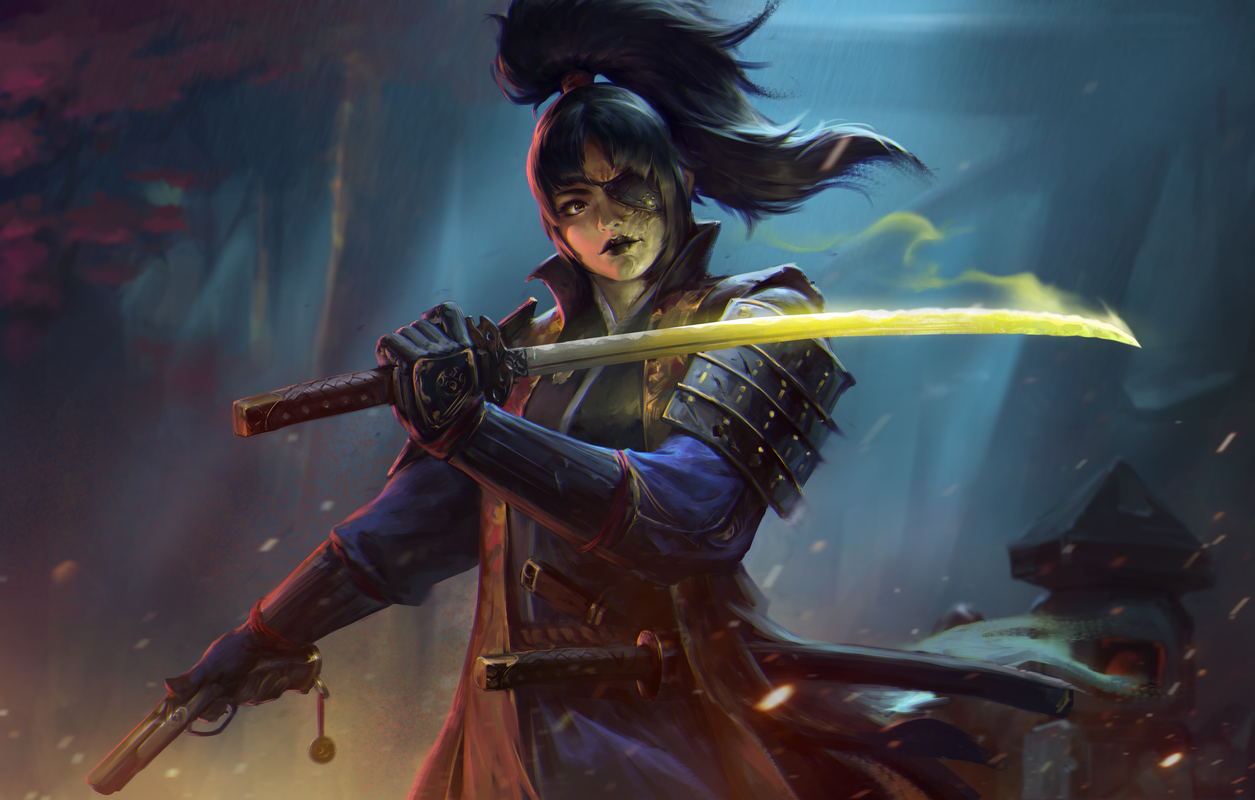

Holy Zeal
Also at 3rd level, your holy fervor lets you see the hand of providence in your daily works. When you cast a spell of 1st level or higher, you are sheathed in a radiant light, granting temporary hit points equal to your proficiency bonus. When you lose these temporary hit points, or start your turn with them, you gain 1 point of Panache.
Additionally, you gain proficiency in Religion or Intimidation, or another skill of your choice if you are already proficient in both.
Inquisitor's Light
Also at 3rd level, you learn a new deed.
Inquisitor's Light: You summon your faith to enable you to smite your foes. As a bonus action, you can cloak your weapon in holy radiance, spending 1 Panache for a melee weapon or 2 for a ranged weapon. The next time you hit an enemy with that weapon, they take an additional 1d6 radiant damage.
You can expend spell slots in place of Panache when you perform this deed. The cost is reduced by 1 point of Panache per slot level, and the radiant damage increases by 1d6 per slot level, up to a maximum of 5d6.
Divine Hand
At 7th level, your sacred magic infuses your combat prowess. Whenever you cast any of your inquisitor spells, you can make one weapon attack as a bonus action.
Overwhelming Zeal
At 11th level, your Holy Zeal ability improves. When you gain Panache from it, you now gain 2 points of Panache.
Blinding Light
Additionally at 11th level, you learn a new deed.
Blinding Light: As a reaction when a creature hits you with a melee attack, you can spend 3 Panache to strike them with a flash of holy light. They must succeed on a Constitution saving throw or be blinded until the start of your next turn. Regardless of the result, they must reroll the attack roll and use the new result.
Blessings of Faith
At 15th level, your sheer presence empowers your divine magic. Whenever you cast a spell of 1st level or higher, you can spend 2 Panache to increase its slot level by 1.
Smite the Wicked
At 20th level, your holy strikes have the full force of divine favor behind them . Once per turn when you make an attack with advantage or damage an enemy with your Inquisitor's Light, you may spend all your remaining Panache to deal 1d6 bonus radiant damage per Panache spent. If this brings the target to 0 hit points, you regain the Panache spent.
Inquisitor Spellcasting
| Level | Cantrips Known | Spells Known | 1st | 2nd | 3rd | 4th |
|---|---|---|---|---|---|---|
| 3rd | 3 | 3 | 2 | — | — | — |
| 4th | 3 | 4 | 3 | — | — | — |
| 5th | 3 | 4 | 3 | — | — | — |
| 6th | 3 | 4 | 3 | — | — | — |
| 7th | 3 | 5 | 4 | 2 | — | — |
| 8th | 3 | 6 | 4 | 2 | — | — |
| 9th | 3 | 6 | 4 | 2 | — | — |
| 10th | 4 | 7 | 4 | 3 | — | — |
| 11th | 4 | 8 | 4 | 3 | — | — |
| 12th | 4 | 8 | 4 | 3 | — | — |
| 13th | 4 | 9 | 4 | 3 | 2 | — |
| 14th | 4 | 10 | 4 | 3 | 2 | — |
| 15th | 4 | 10 | 4 | 3 | 2 | — |
| 16th | 4 | 11 | 4 | 3 | 3 | — |
| 17th | 4 | 11 | 4 | 3 | 3 | — |
| 18th | 4 | 11 | 4 | 3 | 3 | — |
| 19th | 4 | 12 | 4 | 3 | 3 | 1 |
| 20th | 4 | 13 | 4 | 3 | 3 | 1 |
Code of the Tinkerer
Tinkerers are cunning and ingenious, swashbucklers who combine their martial skill with a deep interest in technology and clockwork. They construct clever gadgets, using them to distract, debilitate, or otherwise control their foes. But they are no less skilled with blade and shot, for that.
Tinkerers are more likely to come from wealth, affording them the resources to learn their craft. But that is not an ironclad rule, and they may come from any background as long as their history grants them the needed skill. Their alignment may likewise fall anywhere along the spectrum; the Tinkerer's code is concerned with the "how" of swashbuckling, with little thought given to the "why".
Code as Craft
When you adopt this code at 3rd level, you gain proficiency with tinker's tools, or another tool proficiency of your choice if you are already proficient. You also gain one additional tool proficiency of your choice. You can use your Charisma in place of your Intelligence for any tool checks that call for Intelligence.
Tinkerer's Gadgets
Also at 3rd level, you learn to construct small, single-use gadgets to augment your combat prowess. You may construct one gadget over the course of 10 minutes, which can be part of a short or long rest. You may have up to two gadgets at a time, and only you may make use of them. The available gadgets are listed below.
Smoke Bomb
You construct a smoke grenade. You can deploy it as a bonus action, throwing the bomb at a point you can see within 30 feet, creating a 10-foot or 20-foot radius (your choice) cloud when it explodes. The cloud's area is heavily obscured, and it lasts until the end of your next turn.
Poison Needle
You create a poisoned needle, which functions as a simple weapon with the finesse, light, and thrown (15/30) properties, and is deployed by making an attack. On a hit, the needle deals 1 piercing damage, and the target must make a Constitution saving throw. On a failure, it takes 2d6 poison damage and is poisoned for 1 minute. It can repeat the saving throw at the end of each of its turns to end the condition. Your poison needle's damage goes up by 1d6 when your proficiency bonus increases, and it is expended after poisoning one creature.
Clockwork Companion
You construct a small construct, which can aid you in or out of combat. You can deploy it as an action, as if you had cast find familiar, with the following changes:
- The creature's type is Construct.
- It gains additional hit points equal to your swashbuckler level.
- It acts on your turn.
- It cannot be dismissed into a pocket dimension.
While your Clockwork Ally is deployed, you can spend 1 Panache to allow it to take an additional action on its turn, out of the Disengage, Dodge, and Help actions.
Graceful Gadgetry
Aditionally at 3rd level, your gadget use flows into your combat style. When you deploy a gadget, you gain 1 Panache immediately, and another 1 Panache at the start of your next turn.
Tuned Defenses
At 7th level, you construct a single-purpose defensive system, such as armor plating or an intercepting arm, and use it to protect yourself. Choose one of the following benefits:
- You gain resistance to acid, cold, fire, lightning, or poison damage.
- You gain a +1 bonus to your AC.
- After a long rest, you gain temporary hit points equal to half your swashbuckler level.
You may change this benefit after a long rest.
Improved Gadgetry
At 11th level, all your Tinkerer's Gadgets are improved. You can carry 1 additional gadget, and each one is upgraded as listed below.
Dizzying Smoke Bomb
You refine your smoke bombs, even as you develop goggles to allow you to see through them. You may see through your smoke bombs. Creatures blinded by the smoke are disoriented by it, receiving disadvantage on Dexterity saving throws.
Paralytic Needle
If a creature that is already poisoned fails a save against your Poison Needle, it is paralyzed until the end of its next turn.
Clockwork Trickery
Your Clockwork Companion can deploy Smoke Bombs or Poison Needles as an action, and it gains a bonus to its armor class equal to your Charisma modifier.
Expanded Gadgetry
At 15th level, you master the use of two additional gadgets.
Incendiary Autoloader
You construct a mechanical arm, specialized in the use of your ranged weapons. You may ignore the loading property on your weapons. In addition, you may load a weapon one time with a special projectile, which deals an additional 2d6 fire damage.
Clockwork Caltrops
You construct automatic caltrops, capable of telling friend from foe and adapting accordingly. As a bonus action, you may scatter these caltrops across a 20-foot square within 15 feet. Creatures of your choice moving within the area must make a Dexterity saving throw or have their movement reduced by half. Your Clockwork Companion is able to deploy these as an action.
Treacherous Tinkering
At 20th level, you are a master at taking advantage of your gadgets' effects. The first time on your turn you hit a creature blinded by your Smoke Bomb, poisoned by your Poison Needle, or slowed by your caltrops, the attack is a critical hit.
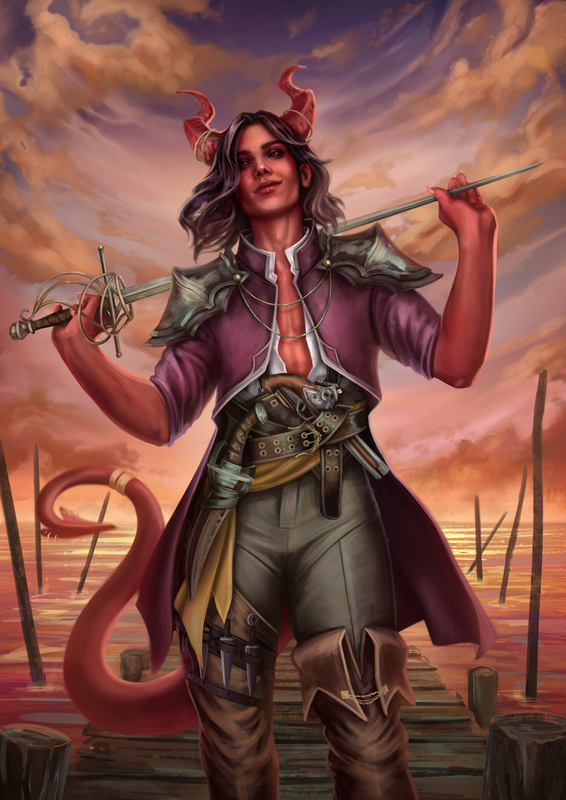

Code of the Scoundrel
The idea of a scoundrel's code may be a bit of an oxymoron, but scoundrels themselves are very real and greatly feared. They are low-down knaves, swashbucklers who get their way through stealth, intimidation, and dishonorable tactics. Scoundrels avoid fair fights, preferring to bring superior numbers and gang up on their enemies.
Scoundrels may come from any background - some are unscrupulous upstarts, while others are a profound disappointment to their noble relatives. They're more likely to be chaotic or evil than other swashbucklers, but it's far from universal - scoundrels can be brutal captains or knaves with a heart of gold.
Skullduggery
When you adopt this code at 3rd level, your abilities take a suspicious turn. You gain proficiency with Sleight of Hand or Intimidation, or another swashbuckler skill of your choice if you are already proficient with both. When you make a Dexterity (Sleight of Hand) check, you can add your Charisma modifier to the result.
Black Spot
Also at 3rd level, your crew is able to follow your lead when it comes to punishing your enemies. Once on your turn when you hit an enemy with a weapon attack, you can mark them for an ally to follow up. The next time an ally hits a marked target with an attack, the attack gains the following effects:
- The attack deals an additional 1d6 damage.
- You gain 1 Panache.
- The marked target can't make opportunity attacks until the start of your next turn.
Gang Up
Also at 3rd level, you learn a new deed.
Gang Up: As a bonus action, you can spend 2 Panache to grant one ally within 30 feet an additional attack the next time they take the Attack action.
Meat Shield
At 7th level, you're willing and able to sacrifice others to protect yourself from harm. When you make a Dexterity saving throw, you can add your Charisma modifier to the result if another creature within 5 feet is making a saving throw against the same effect. If you add your Charisma modifier in this way, the other creature subtracts it from their result.
Improved Black Spot
At 11th level, your Black Spot grows more fearsome. Your Black Spot ability's bonus damage increases to 2d6, and you gain 2 Panache when an ally activates it.
All for One
At 15th level, you have a near-mystical skill for taking advantage of openings your allies create. As a reaction when an ally within 30 feet succeeds on an attack roll or ability check, you can take the d20 roll for yourself. The next time you make an attack or ability check, you do not roll, and instead use this d20 result.
The ally rerolls the attack or ability check and adds your Charisma modifier, keeping the new result.
And One for All?
If your players are concerned about Meat Shield and All for One causing discord, you can amend Meat Shield to work on enemies or willing allies, and All for One to only work on willing allies.
Dread Captain
At 20th level, your fearsome reputation precedes you. When you roll initiative, every enemy who can see you must make a Wisdom saving throw, with the DC equal to your passive Intimidation score. On a failure, they begin combat marked by your Black Spot ability.
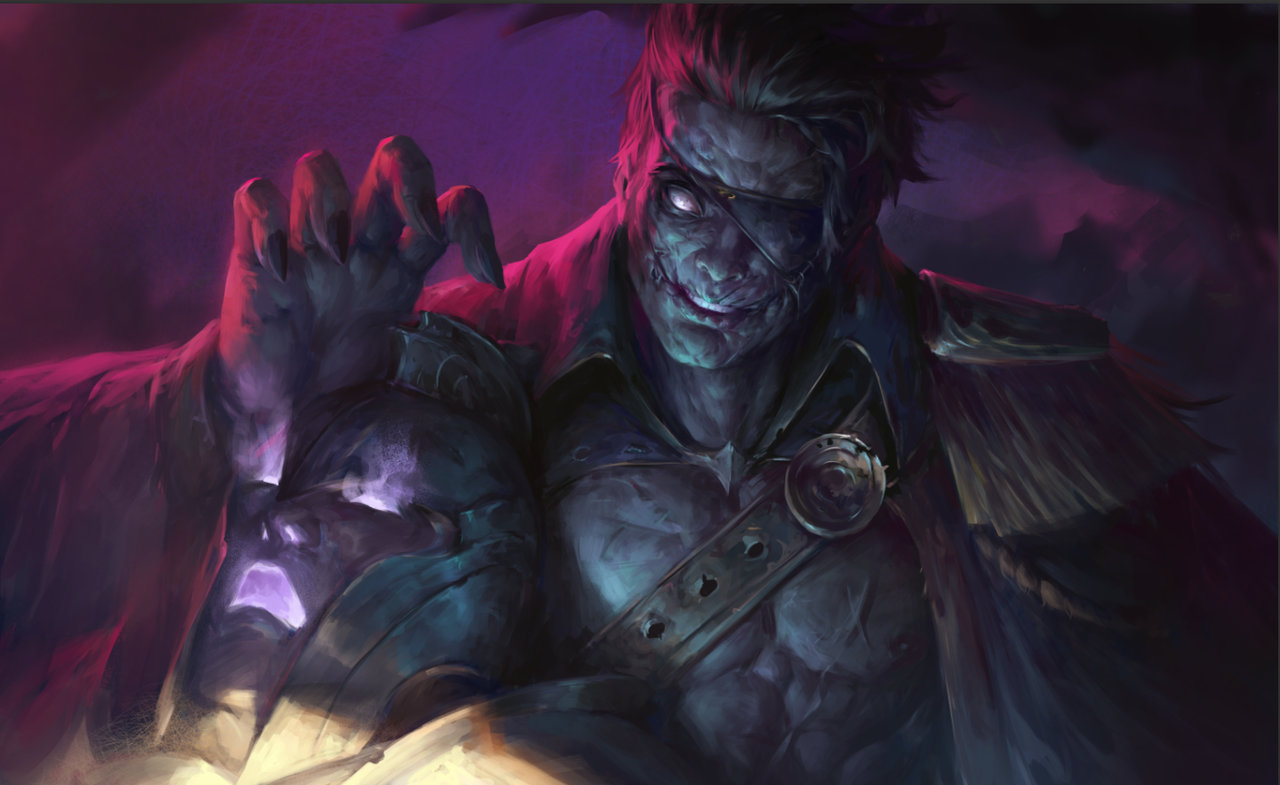


Code of the Grimhunt
No swashbuckler is more terrifying than a grimhunt. They are individuals who've been touched by strange entities, granting them psionic powers. But a grimhunt's powers come with a predatory bent, leading them to combine mind-leeching psionics with swashbuckling skill, becoming a fearsome stalker.
The defining feature in a grimhunt's background is how they gained their psychic abilities. Perhaps it was an extraplanar influence, a magical accident, or a quirk of their bloodline. Their powers certainly lead towards a morally questionable path, but grimhunts vary from unhinged predators to principled vigilantes.
Mind Hunter
When you adopt this code at 3rd level, you hone your skill for seeking out vulnerable minds. You gain proficiency with Stealth, or a swashbuckler skill of your choice if you are already proficient. You also gain 15-foot mindsight, allowing you to see creatures with an Intelligence of 6 or higher within 15 feet as if by blindsight.
Psionic Predator
Also at 3rd level, you gain access to the Mind Leech psionic power. You gain a number of psi points equal to your proficiency bonus, regaining them on a short or long rest. You can use these points to empower your Mind Leech. The DC for your psionic abilities is equal to your panache save DC.
When you use your action on a psionic power, you can make one attack as a bonus action before the end of your turn.
Mind Leech
Psionic Power
- Casting Time: 1 action
- Range: 30 feet
- Components: S
- Duration: Instantaneous
You assault the mind of a target you can see within range, rending and devouring its psionic energy. The target must succeed a Charisma saving throw or take 1d6 psychic damage. If the target is frightened, charmed, stunned, restrained, grappled, or paralyzed, the psychic damage becomes 1d12 instead. On a failed save, you gain a psionic charge of consumed power until the end of your next turn. You can expend this charge in one of three ways:
- When you deal damage, to deal additional psychic damage equal to your Charisma modifier.
- At the end of your turn, to gain temporary hit points equal to your Charisma modifier.
- At the end of your turn, to gain 2 points of panache.
You can spend psi points to add the following modifiers (you can add multiple modifiers). The points must be spent when choosing the target of the power.
Rending (1+ psi points): The target takes an additional die of damage (1d6 or 1d12 as applicable if they under the effect of a listed condition) per psi point spent.
Shredding (1 psi point): You leave the target's mind shredded, reducing their next saving throw before the end of your next turn by 1d4.
Nourishing (1 psi points): On a failed saving throw, you gain 1 point of panache.
Devouring (2 psi points): The range of Mind Leech becomes a radius of 5 feet, centered on you.
Stunning (3 psi points): On a failed saving throw, the target becomes stunned until the start of your next turn. If the power effects multiple targets, select one target for this effect.
Night Stalker
At 7th level, you begin to prowl the dark places, awaiting your targets. You can cast invisibility anytime you are obscured, using Charisma as your spellcasting modifier. You can cast the spell in this way once, regaining the ability after a short or long rest.
When you are hidden from a creature, it has disadvantage on saving throws against your Mind Leech power.
Psychic Siphon
At 11th level, you become able to absorb latent psionic energy as it flows around you. When you gain a psionic charge with Mind Leech, you also gain 1 panache. Additionally, as a reaction when a creature of CR 1/4 or higher dies within 15 feet of you, you can absorb 1 psi point.
Psychic Rend
Also at 11th level, you learn a new deed.
Psychic Rend: When you hit an enemy with a weapon attack, you can expend 1 panache to change all the attack's damage to psychic damage.
Adaptive Predator
At 15th level, you can use your powers to explore and assume the identities of others. You learn disguise self, and can cast it at will. Additionally, you can perform a 1-minute ritual over an unconscious or recently-slain creature. If you do so, you gain the following benefits:
- You gain one damage resistance or saving throw proficiency the target possessed.
- You gain one skill and one language proficiency the target possessed.
- You gain the ability to mimic the target's speech perfectly.
- You learn one secret only known to the target.
You can absorb abilities from one target at a time with this ability. If you target another creature, you lose the benefits gained from the first.
Neural Lash
At 20th level, you can mentally link yourself to an enemy, invading their mind and reading their actions. As a bonus action, you force a creature you can see within 30 feet to make a Charisma saving throw. On a failure, you invade their mind for 1 minute. While you are inside their mind, they must subtract 1d4 from all their attack rolls, ability checks, and saving throws. You can add that 1d4 result to your d20 roll the next time you make an attack against them, which may result in a critical hit.
The target can attempt the saving throw at the end of each of their turns, ending the effect on a success.
Code of the Blooded
Many swashbucklers come by their skill honestly, training diligently to master blade and pistol. Others, by chance or intent, find alternate ways to improve their strength and agility. The Code of the Blooded is for secretive swashbucklers who've been able to augment their power with just a touch of the vampire's curse. They may have sought out vampiric powers in a quest for power or been an unwilling victim of a bloodsucking fiend. Regardless of their origin, blooded swashbucklers are able to sap life from their enemies and draw on any number of dark powers.
Blooded swashbucklers may come from any background and any alignment. Their behavior is defined by their power's origin, how they react to it, and how they use it — not any preconceived notion of what they must be.
Blood Sense
When you adopt this code at 3rd level, you gain a touch of the vampire's predatory nature and supernatural resilience. You have advantage on Wisdom (Survival) and Wisdom (Perception) checks to track or find creatures that have recently been wounded, and you are immune to nonmagical diseases.
Blood Frenzy
Also at 3rd level, you are strengthened by the blood of your foes. When you reduce an enemy of challenge rating 1/4 or higher to 0 hit points with a weapon attack, you gain 1 Panache and enter into a blood frenzy, gaining the following benefits for 1 minute.
- The first time you hit an enemy with an attack on your turn, you deal 1d4 additional damage.
- When you reduce an enemy to 0 hit points, you gain 1 additional Panache.
Your Blood Frenzy stacks multiple times, increasing based on your level in this class. At 3rd level, you can have up to 2 stacks. This increases to 3 at 5th level, 4 at 9th level, 5 at 13th level, and 6 at 17th level.
In addition, you gain 2 Panache the first time you suffer piercing or slashing damage in any combat.
Blood Drain
Also at 3rd level, you learn a new deed.
Blood Drain: As a bonus action, you can spend 2 Panache to bite an enemy, making a special unarmed strike against a target within 5 feet. This attack deals 1d4 + your Strength modifier piercing damage, and has the finesse property. On a hit, you gain temporary hit points equal to the damage dealt.
Supernatural Agility
At 7th level, you gain a measure of the vampire's physical prowess. Your jump distance is doubled and your movement speed increases by 10 feet.
In addition, you can cast the spider climb spell, with no components and a 1-minute duration. You can cast the spell in this way once, regaining the ability after finishing a short or long rest.
Greater Frenzy
At 11th level, your bloodlust grows. When your Blood Frenzy is not active, the next time it becomes active, it starts at two stacks.
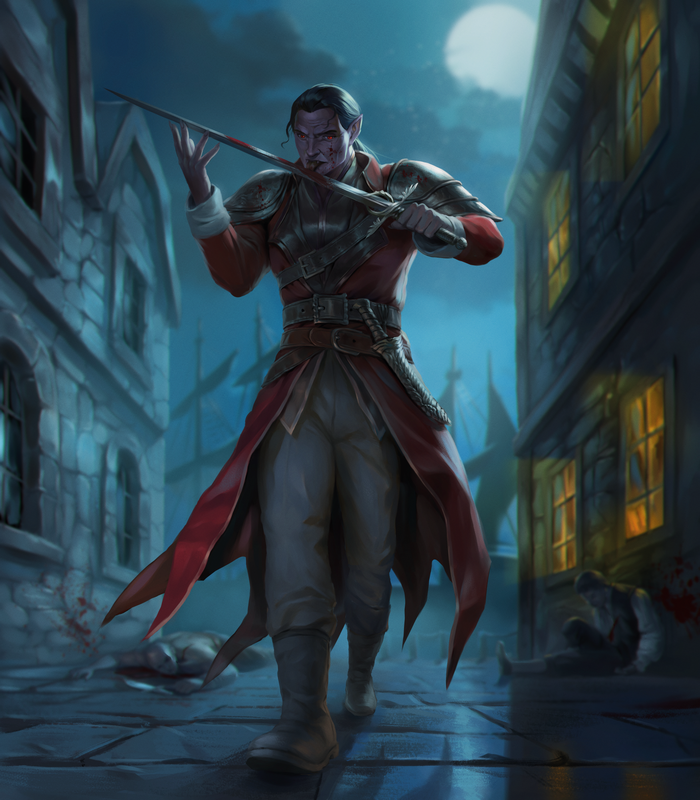

Mist Form
At 15th level, you can transform yourself and all your possessions into a cloud of mist as an action. While transformed, you gain a 15-foot flying speed with hover and resistance to nonmagical damage. You can pass through spaces as narrow as 1 inch wide, and cannot be grappled or restrained. You can still make attacks, but only with unarmed strikes. You can't talk, manipulate objects, or cast spells.
This transformation lasts for 1 minute, or until you end it as a bonus action. After you transform in this way, you can't do so again until you finish a long rest.
Complete Bloodthirst
At 20th level, your vampiric nature reaches its full expression. Anytime you score a critical hit, you immediately gain one stack of Blood Frenzy.
Code of the Graceful Fist
Some swashbucklers conduct themselves with a deep discipline, honing their martial skill until it reaches the level of an art. Through meditation and self-reflection, they learn to harness their inner strength, honing all their attention on the tip of their blade. Graceful fists also become masters of unarmed combat, able to flexibly transition between armed and unarmed combat.
Graceful fists are typified by their discipline and focus, not by any moral stances. Accordingly, they may be of any alignment and hail from any background. Many nobler swashbucklers embrace the life of the knight-errant, wandering the land and putting their skills to use in the service of strangers.
Flowing Movement
When you adopt this code at 3rd level, you emphasize skillful maneuvers and dramatic mobility. You gain proficiency with Acrobatics, or a swashbuckler skill of your choice if you are already proficient. In addition, you can use your Dexterity in place of your Strength for calculating your jumping distance.
Martial Heroics
Also at 3rd level, you have perfected your skill for unarmed combat. As long as you have a free hand, you can use Dexterity instead of Strength for the attack and damage rolls of your unarmed strikes, and you can roll 1d4 for their damage. Once per turn when you hit an enemy with an unarmed strike, you gain 1 Panache.
Flying Fists
Also at 3rd level, you learn a new deed.
Flying Fists: As a bonus action, you can spend 1 Panache to make a single unarmed strike. If you have already moved at least 15 feet on your turn, you can make a second unarmed strike.
Startling Strike
At 7th level, your blows are able to daze your foes, putting them off balance in combat. When you hit an enemy with an unarmed strike, their next attack is made at disadvantage. An enemy affected by your Startling Strike gains immunity to it for 24 hours.
Mystic Blows
Also at 7th level, your unarmed strikes count as magical for the purpose of overcoming resistance and immunity to nonmagical attacks and damage.
Furious Fists
At 11th level, your martial prowess improves. There is no limit to the number of times per turn you can gain Panache from hitting enemies with unarmed strikes.
Heroic Leap
Also at 11th level, you learn a new deed.
Heroic Leap: Anytime you jump on your turn, you can spend 1 Panache to increase your jump distance up to your full movement. You can roll 1d8 for the damage of your next unarmed strike before the end of your turn.
Martial Retort
At 15th level, you learn to use your enemies' attacks to your advantage. As a reaction when an enemy misses an attack against you, you may make one unarmed strike. If the enemy's attack missed as a result of a Swift Parry, you can make this strike without expending a reaction.
Legendary Hero
At 20th level, your legendary skill grants you new abilities:
- Your unarmed strikes deal an additional die of damage when they score critical hits.
- You can make a third attack when you take the Attack action, which must be an unarmed strike.
- When you fail a Dexterity or Constitution saving throw, you can expend 3 Panache to reroll it, keeping the new result.
Appendix 1: New Equipment
Firearms
While the swashbuckler class functions well with standard 5E firearms, it will provide a better play experience if you make the weapons below available in your game. All firearms deal piercing damage. In general, it is suggested to treat firearms as a sort of mundane treasure - because they are typically more powerful than bows and crossbows, they should be difficult to obtain.
Firearms and Range
Since firearms are stronger than bows and crossbows, it is strongly recommended not to allow them to benefit from the Sharpshooter feat's ability to ignore disadvantage at long range. It is also recommended not to allow them to benefit from Crossbow Expert's ability to ignore the loading property.
| Item | Cost | Damage | Weight | Properties |
|---|---|---|---|---|
| Buckler | 20gp | — | 2 lbs. | |
| Arquebus | 120gp | 2d6 | 10 lbs. | Matchlock, Range (80/160), Ammunition (Lead Ball), Loading, Two-handed |
| Hand Cannon | 400gp | 3d8 | 20 lbs. | Matchlock, Range (60/120), Ammunition (Cannon Ball), Two-handed, Heavy, Loading |
| Musket | 250gp | 2d8 | 10 lbs. | Flintlock, Ammunition (Lead Ball), Range (80/240), Loading, Two-handed |
| Pistol, heavy | 300gp | 2d6 | 5 lbs. | Flintlock, Ammunition (Lead Ball), Range (40/120), Loading |
| Pistol, light | 100gp | 2d4 | 1 lb. | Flintlock, Ammunition (Lead Ball), Range (30/90), Loading, Light |
| Lead Ball (20) | 5gp | --- | 3 lbs. | |
| Cannonball (10) | 10gp | --- | 10 lbs. |
Weapon Properties
Flintlock
Flintlocks are a family of firearms operated with a trigger connected to a flint. Pulling the trigger creates sparks, igniting black powder to propel a lead ball.
Flintlocks cannot be used in water, and can be heard 300 feet away.
Matchlock
Matchlocks are a family of firearms operated by lighting a match, which burns down until it ignites powder. With few exceptions, they are not very suitable weapons for adventurers, due to reliability concerns.
They cannot be used in water or in rain, and when a natural 1 is rolled to attack, the mechanism is fouled, requiring 1 minute of repair before it can be used again. The burning match also creates a visible glow, and they can be heard 300 feet away.
The History of Firearms
This is an attempt to simplify real-world firearms, a complicated subject, into something game-friendly and still more detailed than the base game's "pistol" and "musket" categories. Don't @ me.
Items
Buckler
A buckler is a small shield, typically made of metal, which is held in the fist rather than strapped to the arm. A buckler only grants a bonus of +1 to its wielder's armor class, but can be donned or doffed with a free object interaction.
Bucklers function as shields for purposes of feats and other rules concerning shields, and any character proficient with shields is also proficient with bucklers.
Hand Cannon
A hand cannon is an enormously heavy gun - a literal cannon meant for personal use. It requires a Strength of 15 to wield effectively.
Pistols
Flintlock pistols can come in light or heavy varieties; heavy pistols use more gunpowder and fire a heavier bullet, but are correspondingly bulkier to use.
Appendix 2: Magic Items
Baldric of Mimicry
Wondrous Item, uncommon/rare/very rare (requires attunement)
This enchanted baldric is a favorite of seaborne swashbucklers, particularly pistoliers. It has multiple straps and holsters in which to stow pistols, with one particular holster inlaid with silver and lavishly decorated. When you attune to the baldric, you may also attune a specific pistol to it. When you attune a magical weapon to the baldric, all other pistols which you keep in the baldric gain the same magical properties. They only function this way when wielded by you.
The number of holsters in the baldric depends on its rarity: 2 for uncommon, 3 for rare, or 4 for very rare.
Dunstan's Dashing Dagger
Weapon (dagger), common
Sir Dunstan was a much-beloved gentleman in his adopted home city of Siriro, and this dagger is all that remains of his fabled armory. It is beautifully decorated, with a mother-of-pearl hilt, and a silver-blue mirrored sheen to its blade. You can use this dagger as a mirror, and if you look at yourself in it while styling your hair, you can replicate Sir Dunstan's legendary coiffure impeccably.
Pomade of Power
Wondrous item, rare
This ornate metal tin contains 1d6+1 doses of a thick, viscous gel, which smells vaguely of sandalwood. You can spend 1 minute styling a creature's hair or facial hair with the pomade. If you do so, that creature gains the following benefits for 1 hour:
- Advantage on initiative rolls
- Advantage on checks or saving throws to escape the grappled and restrained conditions
- 2d8 temporary hit points
Additionally, if the creature is a swashbuckler, they gain 1 additional Panache at the end of any round in which they have gained Panache. Creatures without any hair cannot use the pomade.
Scintillating Doublet
Wondrous item, common
This finely-made doublet glitters subtly in the light, and has an iridescent sheen. While wearing this doublet, you know the befriend* cantrip, with Charisma as your spellcasting ability.
In addition, as a bonus action, you can change the doublet's pattern or color. No matter what you select, it is always gaudy.
Telescoping Musket
Weapon (musket), uncommon/rare/very rare (requires attunement)
This musket has a series of intricate grooves and sleeves all along its barrel. You gain a bonus to attack and damage rolls made with this magic weapon according to its rarity (+1/+2/+3).
While you are attuned to the musket, as an action you can collapse it down, telescoping its barrel into itself until the weapon is the size of a shot glass. When collapsed this way, it weighs half a pound, and can be easily concealed. You can expand a collapsed weapon as a bonus action.
The Last Mate's Cannon
Weapon (hand cannon), very rare (requires attunement)
This hand cannon has been handed down through unknown generations of unlucky first mates, always hoping to captain their own ship and meeting an untimely end first. You gain a +3 to attack and damage rolls with this magic weapon.
When you load this weapon, you can choose to imbue the cannonball with the spirit of one of its prior wielders. Select one of the following effects, which applies to your next shot.
- 1, Desperate: If the attack is a critical hit, it deals an additional 18 piercing damage.
- 2, Greedy: If the attack kills its target, 1 gold piece appears in your pocket.
- 3, Hapless: If you would have disadvantage on the attack, you instead have advantage.
- 4, Haunted: The attack deals cold damage instead of piercing, and the target cannot recover hit points until the end of your next turn.
- 5, Terrified: If your target survives the attack, you may take the Dash action as a bonus action, and half cover functions as three-quarters cover until the start of your next turn.
- 6, Vengeful: If the attack targets a creature who has previously damaged you, it gains advantage.
Each spirit may be used once, and you regain the use of all of them after a long rest.
Curse. While attuned to this weapon, you must roll a d6 at dawn each day. You adopt the personality trait of the spirit you roll until dawn of the next day. Additionally, the amount of time you can hold your breath is reduced by half.
Appendix 3: Spells
Befriend
Enchantment cantrip
- Classes: Bard, Sorcerer, Warlock, Wizard
- Casting Time: 1 action
- Range: 30 feet
- Components: S, M (1 cp, which is consumed in the casting)
- Duration: Concentration, up to 10 minutes
- Replaces: Friends
Select one creature you can see within range. For the duration, you have advantage on Charisma (Persuasion) or Charisma (Deception) checks to interact with the target. Afterward, the target is aware you magically influenced it, and becomes hostile toward you. A violent creature might attack you, while others might spread word of your treachery, summon the authorities, or otherwise attempt to thwart you.
Phantasmal Horror
4th-level illusion
- Classes: Wizard
- Casting Time: 1 action
- Range: 120 feet
- Components: V, S
- Duration: Concentration, up to 1 minute
- Replaces: Phantasmal Killer
You select a creature you can see within range and create an illusion of its worst nightmares, which only it can see. At the start of each of the target's turns, they must make a Wisdom saving throw. On a failed save, they take 4d10 psychic damage and are frightened. On a successful save, the spell ends.
At Higher Levels. When you cast this spell using a spell slot of 5th level or higher, the damage increases by 1d10 for each slot level above 4th.
Credits & References:
Swashbuckler created by somanyrobots Discord | Patreon
Spells
Befriend, Phantasmal Horror by Omega Ankh & somanyrobots
Mechanics
Psionics adapted from KibblesTasty's Psion
Art
- Pirate Swashbuckler, by Alifka Hammam Nugroho
- Sailing Ship, by Olga Jaworska
- Shipwreck, by Olga Jaworska
- Human Duelist, by Duong Thanh Lam
- Human Pistolier, by Trung Tin Shinji
- Drow Trickster, by Zana Arnautovic
- Minotaur Ruffian, by Alifka Hammam Nugroho
- Human Inquisitor, by Duong Thanh Lam
- Tiefling Scoundrel, by Zana Arnautovic
- Human Grimhunt, by Duong Thanh Lam
- Human(?) Blooded, by Roberto Andreas
Background Image Stains
License
© 2024 somanyrobots, CC BY-NC 4.0
Includes spells from Spells That Don't Suck by Omega Ankh and somanyrobots, which is licensed CC-BY and available here.
Thank you supporters!
A heartfelt thank you to all my patrons, whose generous support helps make this work possible. And a special thank you to:
- arawnannwn
- bluewarbler
- David Sharp
- Erratic Berry
- GlaciesGlace
- Graham Hildebrandt
- Maya
Changelog
v1.2
- Reduced Panache generation from Marked Foe
- Slightly adjusted the Pistolier's Panache generator
- Removed Thrown Weapon Fighting (non-SRD)
- Buffed Marked Foe (can use as part of initiative roll)
- Various rephrases for clarity
- Updated artwork
v1.1
- Nerfed Graceful Fist's interaction with Surprising Strike
- Remove Panache gain from Graceful Fist's Martial Retort
v1.0
- Added the Code of the Graceful Fist!
- Replaced all MtG placeholder art
- Updated licensing
v0.13
- Added the Code of the Blooded!
- Some changes to art and layout
v0.12
- Added the Code of the Grimhunt!
- Renamed Skilled Appraiser TotT
v0.11.1
- Adjusted Instant Action to account for panache change from 0.10.1
v0.11
- Added the Code of the Scoundrel!
v0.10.1
- Tweaked Deft Strike to remove path-dependence within your turn
- Granted 1 Panache after every initiative roll
- Fixed a bad art link and some tiny formatting
v0.10
- Added the Code of the Tinkerer!
- Fixed missing buckler proficiency
- Updated art for Trickster & Inquisitor
- Moved Multiclassing block
- Removed Tricks of the Trade progression after 4
v0.9.1
- Added befriend cantrip and restored Scintillating Doublet
v0.9
- Added the Code of the Inquisitor!
- Increased Fading Blow cost to 2 Panache
- Changed equipment from scholar's to explorer's pack
- Temporarily removed Scintillating Doublet
v0.8.2
- Some clarifications and edge-case fixes on Duelist's Marked Foe and Infuriating Taunt.
v0.8.1
- Added lead balls and cannonballs to items appendix
- Updated Ruffian art
v0.8
- Added the Code of the Ruffian!
- Reworked Hand Cannons
- Buffed Instant Action to short-rest recharge
- Reworked Suave Evasion
v0.7.2
- Fixed infinite-attacks interaction between Surprising Strike and hold person
- Slight wording tweak to Silver Tongue
v0.7.1
- Filled out Magic Items appendix
- Replaced last placeholder paragraph
v0.7
- Added the Code of the Trickster!
- Reworked Suave Evasion
- Buffed Panache generation in all the subclasses at level 11
- Added Gratuitous Flourish
v0.6.1
- Reworked Instant Action
- A bunch of tiny mechanical fixes (shout-out to Dichotomy Games for the excellent feedback)
- Fixed the Pistolier which I'd actually fully broken in v0.6
v0.6
- Added Magic Items index (empty for now)
- Renamed Flashy Fighting
- Removed Flash & Flair
- Removed Stylish Step (it'll come back)
- Moved Snap Shot to 11th to replace Suppressing Shot, replaced Snap Shot with Packed Powder
v0.5
- Added Equipment index
v0.4.1
- Unnerfed Flash and Flair
v0.4
- Raised Pistolier's Panache costs ~everywhere
- Eliminated Pistolier's 3x crits
- Nerfed Flash and Flair to temporary Panache
v0.3
- Added the Code of the Pistolier!
v0.2
- Added levels 11-20
v0.1
- Roughest Draft
- Base class levels 1-10
- Duelist levels 1-11
